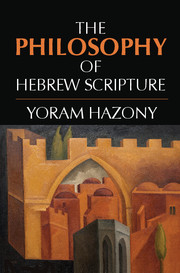Book contents
- Frontmatter
- Contents
- Acknowledgments
- Note on the Text
- Introduction Beyond Reason and Revelation
- Part I Reading Hebrew Scripture
- 1 The Structure of the Hebrew Bible
- 2 What Is the Purpose of the Hebrew Bible?
- 3 How Does the Bible Make Arguments of a General Nature?
- Part II The Philosophy of Hebrew Scripture
- Part III Conclusion
- Appendix What Is “Reason”? Some Preliminary Remarks
- Notes
- Index of Names
- Index of Scriptural References
3 - How Does the Bible Make Arguments of a General Nature?
from Part I - Reading Hebrew Scripture
Published online by Cambridge University Press: 05 November 2012
- Frontmatter
- Contents
- Acknowledgments
- Note on the Text
- Introduction Beyond Reason and Revelation
- Part I Reading Hebrew Scripture
- 1 The Structure of the Hebrew Bible
- 2 What Is the Purpose of the Hebrew Bible?
- 3 How Does the Bible Make Arguments of a General Nature?
- Part II The Philosophy of Hebrew Scripture
- Part III Conclusion
- Appendix What Is “Reason”? Some Preliminary Remarks
- Notes
- Index of Names
- Index of Scriptural References
Summary
In the Introduction, I suggested that most or all of the works in the Hebrew Scriptures are more readily understood if read as works of reason rather than works of revelation. This is a view that will strike many as counterintuitive, if only because when we think of “works of reason,” we think of works written to advance theses concerning the way the world is in general, beyond the experiences of any given individual or nation. And most of the biblical texts just seem to be of the wrong genre for making such arguments: More than two-thirds of the Bible consists of narrative prose recounting histories or stories. And narratives seem, by their very nature, to deal with the contingent and the particular. Similarly, the orations in the books of the prophets report to us about particular things that God or individual prophets said or did in response to specific historical events that took place in Jerusalem or Babylon. The specificity of these texts seems to rule out any real possibility that they were intended to engage a tradition of discussion about subjects of a general nature.
In this chapter, I will argue that the suspicion that the biblical texts are unable to advance theories or arguments of a general nature derives from a lack of familiarity with the way in which the biblical authors present such arguments. In fact, the biblical authors did develop methods for overcoming the limitations of narrative and oratory so as to be able to express themselves on general questions, just as the early Greek philosophers adapted the forms of poetry and stage dramas to the needs of their philosophical investigations. In what follows, I will describe some of the techniques employed in the Bible for this purpose, looking first at (i) the biblical mode of argument as it finds expression in the narratives, and then at (ii) the prophetic orations. I’ll close with a discussion of (iii) the way in which the legal material included in the History of Israel – the law of Moses – fits into the larger pattern of argumentation in the History and in prophetic oratory.
- Type
- Chapter
- Information
- The Philosophy of Hebrew Scripture , pp. 66 - 100Publisher: Cambridge University PressPrint publication year: 2012



